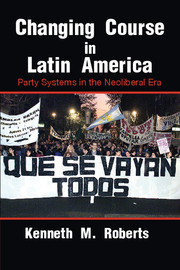Description
Changing Course in Latin America
Party Systems in the Neoliberal Era
Cambridge Studies in Comparative Politics Series
Author: Roberts Kenneth M.
This book explores the impact of economic crises and free-market reforms on party systems and political representation in contemporary Latin America.
Language: English
Subject for Changing Course in Latin America:
Approximative price 92.80 €
In Print (Delivery period: 14 days).
Add to cart
Changing Course in Latin America
Publication date: 01-2015
Support: Print on demand
Publication date: 01-2015
Support: Print on demand
Changing Course in Latin America
Publication date: 01-2015
368 p. · 15.1x22.9 cm · Paperback
Publication date: 01-2015
368 p. · 15.1x22.9 cm · Paperback
Description
/li>Contents
/li>Biography
/li>
This book explores the impact of economic crises and free-market reforms on party systems and political representation in contemporary Latin America. It explains why some patterns of market reform align and stabilize party systems, whereas other patterns of reform leave party systems vulnerable to widespread social protest and electoral instability. In contrast to other works on the topic, this book accounts for both the institutionalization and the breakdown of party systems, and it explains why Latin America turned to the Left politically in the aftermath of the market-reform process. Ultimately, it explains why this 'left turn' was more radical in some countries than others and why it had such varied effects on national party systems.
1. Introduction: party system change in the neoliberal era; Part I. Explaining Regional Patterns: 2. Partisanship and the puzzle of party system stability; 3. Critical junctures and party system change; 4. Antecedent conditions: party system differentiation in twentieth-century Latin America; 5. Neoliberal critical junctures and party system stability; 6. Programmatic (de-)alignment and party system stability in the aftermath period; Part II. National Experiences in Comparative Perspective: 7. Critical junctures in elitist party systems; 8. Critical junctures in labor-mobilizing party systems; 9. Aftermath: reactive sequences and institutional legacies; 10. Conclusion: political legacies and the crisis of representation; Appendix: election results in Latin America.
Kenneth M. Roberts is Professor of Government at Cornell University. He is the author of Deepening Democracy?: The Modern Left and Social Movements in Chile and Peru (1998). Roberts is the co-editor of The Diffusion of Social Movements: Actors, Mechanisms, and Political Effects (Cambridge, 2010) and The Resurgence of the Latin American Left (2011). His articles have appeared in the American Political Science Review, World Politics, Comparative Political Studies, Comparative Politics, Latin American Politics and Society, and Studies in Comparative International Development.
© 2024 LAVOISIER S.A.S.




